
African wild meat trade holds huge potential
06 June 2023
As the world’s largest free trade area, the African Continental Free Trade Area (AfCFTA) holds immense potential for boosting trade and economic growth and development in Africa.
By reducing tariffs and eliminating non-tariff barriers (NTBs), the AfCFTA, one of the flagship projects of the African Union (AU)’s Agenda 2063: The Africa We Want, aims to significantly boost intra-Africa trade across all sectors of continent’s economy, particularly trade in value-added production. It is, therefore, fitting that AU’s theme for 2023 is “Acceleration of AfCFTA Implementation”.
The AU estimates that there are around 1.3 billion people within the AfCFTA which amounts to a potential $3.4-trillion market. Several international organisations, such as the World Bank and the International Monetary Fund have published research data about the potential benefits of the AfCFTA to the continent. These include, among others, economic integration, increased investment and shared prosperity, a boost in trade, better jobs, and a reduction in poverty.
Estimates indicate that intra-African trade could be boosted by as much as 52.3%. This data also suggests it will possibly double if non-tariff barriers are also significantly reduced.
It is important to note that the benefits would not only extend to intra-African trade, but the increased investment, for example, is also expected to lead to increases in exports to the rest of the world by about 32% by 2035, according to the World Bank.
In celebration of Africa Day today [25 May 2023], it is worth mentioning that the AfCFTA also creates opportunities for the trade in wildlife meat.
The wild meat industry could potentially play a larger role in Africa's trade landscape, offering opportunities for economic development and job creation.
Taking advantage of the opportunities offered by the AfCFTA to grow trade in wild meat will be greatly facilitated by identifying and addressing NTBs that restrict the intra-African wild meat trade. If these NTBs are not resolved, they will limit the growth and potential of the intra-African wild meat trade.

To help address this issue, I conducted research that evaluated the suitability of the AfCFTA NTB Reporting, Monitoring, and Elimination Mechanism that was developed to enhance trade through the removal of NTBs.
Recurring themes that emerged from this research were the lack of certainty about what “wildlife meat” is; the Harmonised System (HS) codes up to six digits not providing enough granularity to accurately determine the size of the wildlife industry and the species being traded through trade statistics; persistent concerns about administrative capacity within regulatory bodies (veterinary and animal health related, especially in the harvesting phase); recurring animal health diseases that inhibit the ability to export certain categories of meat (eg, the inability to export cloven hoofed animals on account of FMD); and a gap in the legal framework of clear, concise, and specific regulation of wildlife meat as a harvestable set of products for export purposes.
The study showed that while the AfCFTA NTB mechanism holds promise, it is still in its early stages and bears similarities to the NTB mechanism in the Southern African Development Community (SADC) region.
Also, the barriers faced by the wild meat industry are not all barriers that the AfCFTA mechanism can reasonably be expected to resolve. The mechanism is not a suitable forum through which to solve the broad challenges that the intra-African trade of wildlife meat faces. There is a lack of awareness of the potential and purpose of this mechanism, and it may be that smaller industries such as the wildlife meat industry are not being reached by AU level capacity building and stakeholder engagement.
As part of the research, two sets of policy recommendations were developed — one related to the technical improvement of the NTB mechanism and another on the broader barriers beyond this mechanism.
The first set of recommendations emphasises the need to:
- Build broad industry awareness and capacity related to international trade;
- Develop specific capacity in the wild meat industry related to the AfCFTA;
- Foster specific capacity in the wild meat industry regarding the AfCFTA NTB mechanism;
- Facilitate easier access to NTB data from the AfCFTA NTB mechanism;
- Prioritize proactive prevention, removal, or mitigation of NTBs; and
- Increase certainty and transparency by establishing a National Monitoring Committee and National Focal Point in member states.
The second set of recommendations focuses on:
- Harmonizing and standardising the definition of wildlife meat;
- Defining HS codes beyond the 6-digit level in national tariff books;
- Addressing specific barriers during the harvesting phase of the value chain;
- Supporting the further development of existing recommendations and strategies to facilitate wild meat imports and exports;
- Collaborating with other industries to remove barriers related to animal health status;
- Creating an open AfCFTA database containing harmonized veterinary certificate templates;
- Developing technical trade literature accompanying permit requests for specialized wild meat products;
- Simplify and streamlining permit procedures;
- Reforming national legal frameworks; and
- Addressing administrative capacity gaps of the competent authorities.
Addressing NTBs in Africa's wild meat trade is crucial for harnessing the full potential of the AfCFTA for the benefit of those in the wild meat industry. The research findings shed light on the limitations of the AfCFTA NTB mechanism and emphasise the need for targeted interventions to facilitate the growth of the industry.
By implementing the recommended policy measures, such as building awareness about the industry, enhancing capacity, and improving access to NTB data, the AfCFTA can effectively remove the barriers hindering the wild meat trade.
Additionally, addressing broader concerns beyond the AfCFTA mechanism, such as harmonising definitions, streamlining permit procedures, and reforming legal frameworks, will create an enabling environment for the sustainable development of the industry.
These findings and recommendations align with the objectives of the AfCFTA and its potential to drive economic integration, increase investment, and alleviate poverty in Africa.
By removing barriers in the wild meat industry, the AfCFTA can boost intra-African trade, enhance the continent’s export capabilities, and stimulate economic growth.
Dr Joubert is a research fellow at the African Wildlife Economy Institute at Stellenbosch University and also a post-doctoral researcher at the University of the Witwatersrand.
Article as posted originally on Africa Day, 25 May 2023, by the Cape Times. It was also shared by Stellenbosch University here.
-

Dr Biandri Joubert
Research Fellow
We support the free flow of information. Please share:
More content
-

What Foot and Mouth Disease-free means for South Africa’s game meat trade
Ms Lydia Daring Bhebe…Explore the latest developments in South African provinces achieving and maintaining Foot and Mouth Disease (FMD) free status…
Articles -

The world wildlife trade regulator is 50 – here’s what has worked and what needs to change
Daniel Challender…Most countries implement Cites, the Convention on International Trade in Endangered Species of Wild Fauna and Flora as…Articles -

Enabling Sustainable Wildlife Trade
Prof Francis VorhiesEnabling sustainable wildlife trade is a key policy measure for growing Africa's wildlife economy. In this respect, CITES…
Articles -

Has CITES become too complicated to be effective?
Prof Francis VorhiesGovernments agreed to the text of CITES in the 1970s, which is quite straightforward. However, the agreement’s implementation…
Articles -

From poachers to providers: Can Africa's wild meat market save wildlife?
Dr Wiseman NdlovuHave you ever considered how wild meat could be more than just a cultural staple but also a…
Articles -

As a fellow of the African Wildlife Economy Institute (AWEI), I am excited to attend the upcoming 3rd…
Articles -

A theory of change to improve conservation outcomes through CITES
Dr Michael 't Sas-Rolfes…Here we articulate the implied theory of change (ToC) underpinning the design and operation of CITES (Convention on...
2025Research -

Wild Meat Value Chain Integration Systems: Opportunities for Value Chain Formalisation and Scaling in Africa
Dr Wiseman Ndlovu…Establishing a legal, safe and sustainable wild meat sector promises to potentially reduce demand for illegally sourced meat...
2025Research -

AWEI's 2024 Wildlife Economy Dialogue Series
Ms Emily TaylorRediscover 2024: A year of insight and inspiration
In 2024, AWEI proudly hosted three ground-breaking dialogue series in…
Articles
Get updates by email
Through impactful research, stakeholder engagement, and professional development, AWEI is supporting the wildlife economy across Africa. Please subscribe for occasional updates on our work and forthcoming events.
Sign up for a quarterly dose of AWEI insights
In a complex and changing world, AWEI generates strategic ideas, conducts independent analysis on wildlife economies, and collaborates with global scholar-practitioners to provide training and expertise for biodiversity conservation, climate resilience, and inclusive economic opportunities in Africa.
